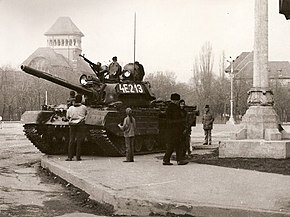Kjedorate regime: Difference between revisions
No edit summary |
No edit summary |
||
| (2 intermediate revisions by the same user not shown) | |||
| Line 1: | Line 1: | ||
[[File:TR-85tankRomanianRevolution1989.jpg|thumb|upright=0.95|A [[Þyposty]] tank situated in central [[Fevilla]].]] | [[File:TR-85tankRomanianRevolution1989.jpg|thumb|upright=0.95|A [[Þyposty]] tank situated in central [[Fevilla]].]] | ||
{{about|the illiberal dominance of the [[Kjedorate Party]] in [[Seketan]] between 1929 to 1978|historical states under the regime|Second Seketese Republic|and|Third Seketese Republic}} | {{about|the illiberal dominance of the [[Kjedorate Party]] in [[Seketan]] between 1929 to 1978|the historical states under the regime|Second Seketese Republic|and|Third Seketese Republic}} | ||
The '''Kjedorate regime''' ([[Seketese language|Seketese]]: ''Sanemyt Kjedoréça'') describes the dominance of the [[Kjedorate Party|Seketese Liberty Party]] in [[politics of Seketan|Seketese politics]] during the [[second Seketese Republic|second]] and [[third Seketese Republic|third republics]] between 1914/24 to 1978. Principally led by presidents [[Loren Allis]] and later [[Etyjen Pesan]], [[Kjedoratism]] was the leading ideology and encompassed {{wp|national conservatism}}, [[Seketese nationalism]], with {{wp|regionalism|regionalist factions}}. | The '''Kjedorate regime''' ([[Seketese language|Seketese]]: ''Sanemyt Kjedoréça'') describes the dominance of the [[Kjedorate Party|Seketese Liberty Party]] in [[politics of Seketan|Seketese politics]] during the [[second Seketese Republic|second]] and [[third Seketese Republic|third republics]] between 1914/24 to 1978. Principally led by presidents [[Loren Allis]] and later [[Etyjen Pesan]], [[Kjedoratism]] was the leading ideology and encompassed {{wp|national conservatism}}, [[Seketese nationalism]], with {{wp|regionalism|regionalist factions}}. | ||
The Seketese Liberty Party was founded in 1904 by political theorist and [[Seketese nationalism|Seketese nationalist]] [[Dann Kjedor]]. After his death in 1913, supporters of Kjedor more rapidly identified as Kjedorates (''Kjedoréça'') under the party's leadership under [[Loren Allis]], who declared Seketan independent from the [[Nelbec Empire]] in 1918 and led the Kjedorate faction of the [[Seketese Revolution]] to victory in 1924, establishing the [[Second Seketese Republic]]. The party democratically retained power until seizing control of institutions in the aftermath of the {{wp|Great Depression}}, establishing the military-police force [[Þyposty]]. | The Seketese Liberty Party was founded in 1904 by political theorist and [[Seketese nationalism|Seketese nationalist]] [[Dann Kjedor]]. After his death in 1913, supporters of Kjedor more rapidly identified as Kjedorates (''Kjedoréça'') under the party's leadership under [[Loren Allis]], who declared Seketan independent from the [[Nelbec Empire]] in 1918 and led the Kjedorate faction of the [[Seketese Revolution]] to victory in 1924, establishing the [[Second Seketese Republic]]. The party democratically retained power until seizing control of institutions in the aftermath of the {{wp|Great Depression}}, establishing the military-police force [[Þyposty]]. | ||
The Kjedorate regime controlled Seketan during the [[Nelborne War]] to which Seketan defended itself against invading Alquiya. Under pressure from the [[Wilsk Representation Movement]], president Allis reorganized the country into a {{wp|unitary}} [[Third Seketese Republic|Third republic]]. [[Etyjen Pesan]] became president in 1960, having already been prime minister since 1945. The last decade of the regime is labeled as the [[Zemasy period]], where it collapsed amid ethnic tensions and an economic crisis. | The Kjedorate regime controlled Seketan during the [[Nelborne War]] to which Seketan defended itself against invading Alquiya. Under pressure from the [[Wilsk Representation Movement]], president Allis reorganized the country into a {{wp|unitary}} [[Third Seketese Republic|Third republic]]. [[Etyjen Pesan]] became president in 1960, having already been prime minister since 1945. The last decade of the regime is labeled as the [[Zemasy period]], where it collapsed amid ethnic tensions and an economic crisis. Its legacy continues to have a [[business as usual|lingering effect]] on Seketese politics today. | ||
==See also== | ==See also== | ||
| Line 11: | Line 11: | ||
*[[Third Seketese Republic]] | *[[Third Seketese Republic]] | ||
*[[Kjedoratism]] | *[[Kjedoratism]] | ||
{{Seketan topics}} | |||
Latest revision as of 23:02, 13 October 2023
The Kjedorate regime (Seketese: Sanemyt Kjedoréça) describes the dominance of the Seketese Liberty Party in Seketese politics during the second and third republics between 1914/24 to 1978. Principally led by presidents Loren Allis and later Etyjen Pesan, Kjedoratism was the leading ideology and encompassed national conservatism, Seketese nationalism, with regionalist factions.
The Seketese Liberty Party was founded in 1904 by political theorist and Seketese nationalist Dann Kjedor. After his death in 1913, supporters of Kjedor more rapidly identified as Kjedorates (Kjedoréça) under the party's leadership under Loren Allis, who declared Seketan independent from the Nelbec Empire in 1918 and led the Kjedorate faction of the Seketese Revolution to victory in 1924, establishing the Second Seketese Republic. The party democratically retained power until seizing control of institutions in the aftermath of the Great Depression, establishing the military-police force Þyposty.
The Kjedorate regime controlled Seketan during the Nelborne War to which Seketan defended itself against invading Alquiya. Under pressure from the Wilsk Representation Movement, president Allis reorganized the country into a unitary Third republic. Etyjen Pesan became president in 1960, having already been prime minister since 1945. The last decade of the regime is labeled as the Zemasy period, where it collapsed amid ethnic tensions and an economic crisis. Its legacy continues to have a lingering effect on Seketese politics today.
